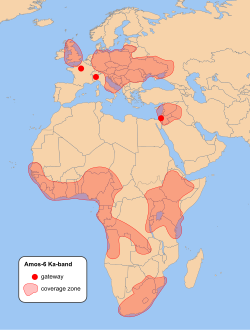Amos-6
| Operator |
|
|---|---|
| Mission duration | Planned: 15 years, Actual: None |
| Spacecraft properties | |
| Bus | AMOS 4000 |
| Manufacturer | Israel Aerospace Industries |
| Launch mass | 5,500 kilograms (12,100 lb) |
| Power | 10 kW |
| Start of mission | |
| Launch date | Never launched. |
| Rocket | Falcon 9 Full Thrust |
| Launch site | Cape Canaveral Air Force Station Space Launch Complex 40 |
| Contractor | SpaceX |
| End of mission | |
| Disposal | Fire in failed launch rocket test |
| Destroyed | 13:07, 1 September 2016 (UTC) |
| Orbital parameters | |
| Reference system | Geocentric |
| Regime | Geostationary |
| Longitude | 4°West |
| Perigee | 35,785 kilometres (22,236 mi) |
| Apogee | 35,800 kilometres (22,200 mi) |
| Transponders | |
| Band | Two S-band transponders |
| Coverage area |  |
Amos-6 was a 5.5-tonne Israeli Earth communications satellite, one of the Spacecom AMOS series, that was built by Israel Aerospace Industries (IAI), a defense and aerospace company.
Amos-6 was intended to be launched on Flight 29 of a SpaceX Falcon 9 to geosynchronous transfer orbit on 3 September 2016. However, on 1 September 2016, during the run-up to a static fire test, there was an anomaly on the launch pad resulting in a fire and the loss of the vehicle and its payload, Amos-6. There were no injuries.
Amos stands for "Affordable Modular Optimized Satellite" and is also an allusion to the prophet Amos. This spacecraft is the second implementation of the AMOS-4000 platform, the first was the Amos-4. It is one of a series of satellites built by Israel Aerospace Industries.
In January 2013, Spacecom announced that they had signed a contract with SpaceX for the 2015 launch of the Amos-6 satellite on a Falcon 9 launch vehicle. Amos-6 was intended to replace the Amos-2 satellite, planned to be retired in 2016. During 2015 Spacecom announced the launch date has slipped to the to mid-2016. A final launch date was set for 3 September 2016.
Under the deal with Spacecom, state-owned IAI, flagship of Israel's defense industry, was contracted to build Amos-6 and its ground control systems, as well as provide operating services. Spacecom estimated that the cost of launching, insuring and one year's operation of Amos 6 would be $85 million.
...
Wikipedia
